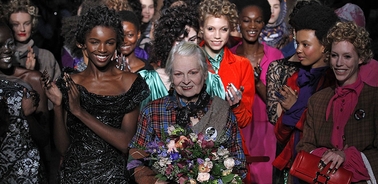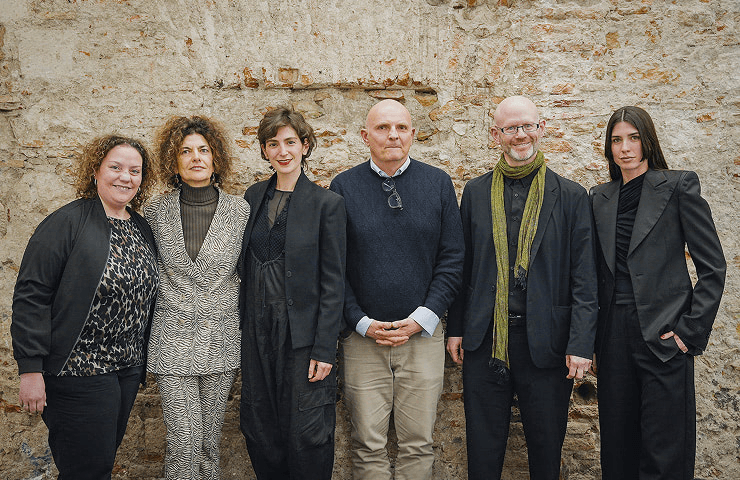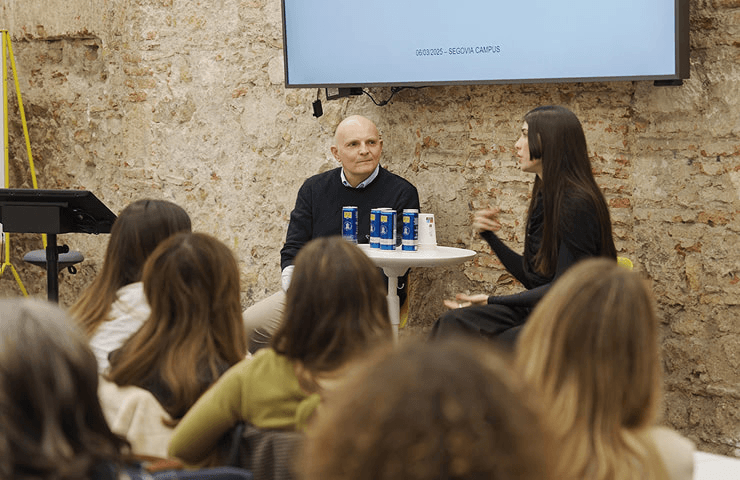Vivienne Westwood’s Legacy and Sustainability Take Center Stage at IE School of Architecture and Design

The event marked the launch of the 'Fashion as Protest: Designing for Change' challenge.
Giorgio Ravasio, Country Manager of Vivienne Westwood Italy and a dedicated member of the brand for over twenty years, recently delivered a lecture on Westwood’s evolving approach to fashion. Ravasio highlighted the brand's increasing focus on sustainability, responsible production, and ethical business practices. The presentation, held at IE University's Segovia campus, was followed by a conversation with Evangelina Julia, professor at IE School of Architecture and Design's Bachelor in Fashion Design and founder of Evade House. Together, they delved deeper into the brand’s transformation and Westwood’s broader vision.
The event marked the launch of the 'Fashion as Protest: Designing for Change' challenge, offering financial support for students interested in pursuing the Bachelor in Fashion Design or any another Bachelor program at IE University. This competition is inspired by Vivienne Westwood legacy and invites participants to create a statement piece that merges sustainability with activism. The designs should address issues such as climate change, social justice, or ethical production, incorporating sustainable practices like upcycling, zero-waste techniques, or the use of eco-friendly materials. Candidates can register for the competition until April 6 to receive all the necessary materials to participate.
Ravasio began by emphasizing that around 2010, Vivienne Westwood underwent a significant transformation, shifting its focus from bold, rebellious designs that challenged gender norms and conventional aesthetics towards sustainability and waste reduction. This shift was driven by Westwood’s growing awareness of the fashion industry’s environmental impact and her commitment to producing durable, timeless pieces that stood in contrast to fast fashion’s disposable nature.
This new direction led to a fundamental restructuring of the company’s business model. Previously operating on a licensing-based system, the brand gradually transitioned to in-house production, a process that took approximately seven years. According to Ravasio, this move allowed the company to take greater control over ethical and environmental practices within its supply chain, ensuring quality control and adherence to sustainable principles. By 2021, Vivienne Westwood "had evolved from being just a creative company to also a production company. This was essential for ensuring that sustainability and ethical standards were embedded in every step of the process", said Ravasio.
During his presentation, Ravasio highlighted the shift in the company’s workforce composition. Where designers once made up 40% of the team, today, 95% of employees come from backgrounds in engineering, logistics, and sustainability planning. This reflects a broader change in the fashion industry, where the ability to manage supply chains responsibly has become just as crucial as creative innovation.
Westwood’s philosophy of “Buy less, choose well, make it last” became the foundation of this transformation. Her approach emphasized quality over quantity, encouraging consumers to invest in timeless pieces rather than follow fleeting trends. This principle also influenced the company’s design strategy—rather than adhering to seasonal trends, Westwood’s collections often drew inspiration from historical and cultural sources, reinforcing their lasting relevance. Ravasio underscored this point, stating, "If you examine the history of our designs, you’ll see that Vivian’s work was never tied to specific seasons, her focus was always on timelessness and inspiration from museums and culture, rather than fleeting fashion cycles."
One of Westwood’s pioneering sustainability initiatives involved considering unisex fashion—not simply as a nod to gender inclusivity but as a practical measure to reduce consumption and waste. As Ravasio explained, “For us, this project was an experiment in reducing complexity for others (...). It was never about gender for Vivian" as the idea was that "by decreasing excess, we could increase value elsewhere.”
Another key takeaway from the discussion was the necessity of financial stability in sustaining independent creative endeavors. Ravasio emphasized that while Westwood rejected the traditional profit-driven luxury model, she understood the need for financial sustainability to maintain independence. "Independence does not mean doing whatever you want—it means being able to sustain your vision without external control,” Ravasio stated.
The panelists stressed that designers today must go beyond aesthetics; they must understand economics, logistics, and sustainability. Ravasio pointed out that “fashion today is less about glamour and more about logistics and responsibility.”
It was also noted that Westwood’s approach to sustainability was deeply research-driven. For instance, she discovered that organic cotton, often perceived as an environmentally friendly choice, required significantly more water than conventional cotton, illustrating the complexities of sustainable decision-making. Her guiding principle was not just about choosing ‘green’ materials but understanding their full impact.

The lecture and subsequent discussion painted a picture of Vivienne Westwood as a visionary who not only influenced fashion but also anticipated crucial shifts towards sustainability and ethics in the industry. Through her pioneering efforts in responsible fashion, Westwood set a precedent that continues to shape the industry’s evolution towards a more sustainable and conscious future. As Ravasio concluded, "Unlike many designers, she was not driven by profit or luxury but by her passion for creating. She lived simply, and her goal was never about excess—it was about making a real impact in the world of fashion and beyond."
Giorgio Ravasio, a law and communications graduate, has extensive experience in cultural development and legal affairs. He joined Vivienne Westwood Italy in 2001 as Head of Legal Affairs, later becoming a board member and Director of Vivienne Westwood Consulting. In 2011, Ravasio was appointed Country Manager of Vivienne Westwood Italy, a role he continues to hold while also overseeing cultural initiatives at theWorld Heritage Listed Site of Crespi d'Adda (BG).
On the cover: photograph by Victor Virgile, courtesy of Vivienne Westwood.
